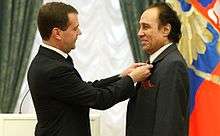Nikolai Slichenko
| Nikolai Slichenko | |
|---|---|
 Nikolai Slichenko, 2010 | |
| Born |
Nikolai Alekseyevich Slichenko December 27, 1934 Belgorod, USSR |
| Occupation | Actor, singer, theatre director |
| Years active | 1951–present |
| Awards |
|
Nikolai Alekseyevich Slichenko (Russian: Никола́й Алексе́евич Сличе́нко; born 27 December 1934) is a Russian singer[1] and chief director of the Romen Theatre in Moscow. His awards include People's Artist of the USSR (1981),[2] State Prize of the USSR (1987), Order of Merit for the Fatherland of the 3d Degree (27 December 2004).[3]
Biography
Nikolai was born in Belgorod area, Russia, in a family of Romani people. Part of his childhood passed during World War II. During the war, Nikolai lost many relatives. In particular, when he was a boy, his father was shot before his eyes in 1942. After the war, the Slichenko family settled at a Romani collective farm in Voronezh Oblast. Teenagers had to work equally with adults. That was the time when Nikolai heard about a Romani theater in Moscow and had dreamt of performing on its stage.
In 1951 Nikolai was accepted into the Romen Theatre. The gifted boy drew the attention of the leading theater masters. Certainly, they did not make it easy for him: he began like most, as an auxiliary staff actor.
Nikolai was first entrusted with a leading role as long ago as 1952, when he was not yet 18 years old. This was at the time when the theater left to Zagorsk (present-day Sergiev Posad) with the play Four Fiancées by Ivan Khrustalev. Nikolai played the role of Leksa, as a substitute for the actor Sergey Fyodorovich Shishkov (of the Shishkov gypsy dynasty) who had become ill. He then played the role of Leksa for many years, and later, as he grew older, played the role of Badi in this play as well.
After the play Slichenko received attention to as a capable actor. The theater began to engage him in the current repertoire plays. In all, at the time he played more than 60 roles in his native theater, and also took part in a number of popular films, including Under the Rain and the Sun, My Island Is Blue, Wedding in Malinovka and others.
In 1977, Nikolai Slichenko became the chief director of the Romen Theatre. For this, he completed the Higher Courses for Directors at the Russian Academy of Theatre Arts in 1972, under the management of the People's Artist of the USSR Andrey Goncharov.
On 4 December 1998, a star with Nikolai Slichenko's name was placed at the Star Square in Moscow.
 |
Milaya
Sample of Milaya by Nikolai Slichenko (1970) |
| Problems playing this file? See media help. | |
 |
Tolko raz
Sample of Tolko raz by Nikolai Slichenko (1983) |
| Problems playing this file? See media help. | |
Awards and honors
- Orders
 Order of Merit for the Fatherland 3rd class (2004)
Order of Merit for the Fatherland 3rd class (2004) Order of Merit for the Fatherland 4th class (1994)
Order of Merit for the Fatherland 4th class (1994) Order of Honor (2009)
Order of Honor (2009)  Order of Friendship (2014)
Order of Friendship (2014) Order of Friendship of Peoples
Order of Friendship of Peoples
- Titles
- People's Artist of USSR (1981)
- People’s Artist of the RSFSR (1975)
- Honoured Artist of the RSFSR (1969)
- Awards
- USSR State Prize (1987)
- Russian Federation Government Prize in the field of culture (2013)
References
- ↑ Music in the USSR. VAAP-INFORM. 1987. p. 22.
- ↑ Николай Сличенко в Российском гуманитарном энциклопедическом словаре
- ↑ Указ Президента РФ от 27 декабря 2004 г. № 1606
External links
- (Russian) Official website
- (Russian) Biography of Nikolai Slichenko